Psychotropic Medications: Benefits and Challenges in Mental Health
VerifiedAdded on 2022/09/16
|13
|3524
|19
Essay
AI Summary
This essay delves into the ongoing debate surrounding the use of psychotropic medications in mental health settings. It presents the arguments of proponents who highlight the benefits in managing difficult behaviors, preventing relapse, and improving patient outcomes, supported by neuroimaging studies and clinical trials. Conversely, the essay explores the viewpoints of opponents who raise concerns about adverse side effects such as obesity, metabolic complications, hypertension, and increased risks of aggression and suicidality. The challenges faced by registered nurses in administering these medications, including patient aggression, burnout, and substance abuse, are also examined. The essay concludes by emphasizing the need for further research to fully understand the long-term impacts of psychotropic medications and to ensure the safety and well-being of both patients and healthcare providers. This research explores the use of psychotropic drugs, their benefits, associated risks, and the challenges faced by healthcare professionals.
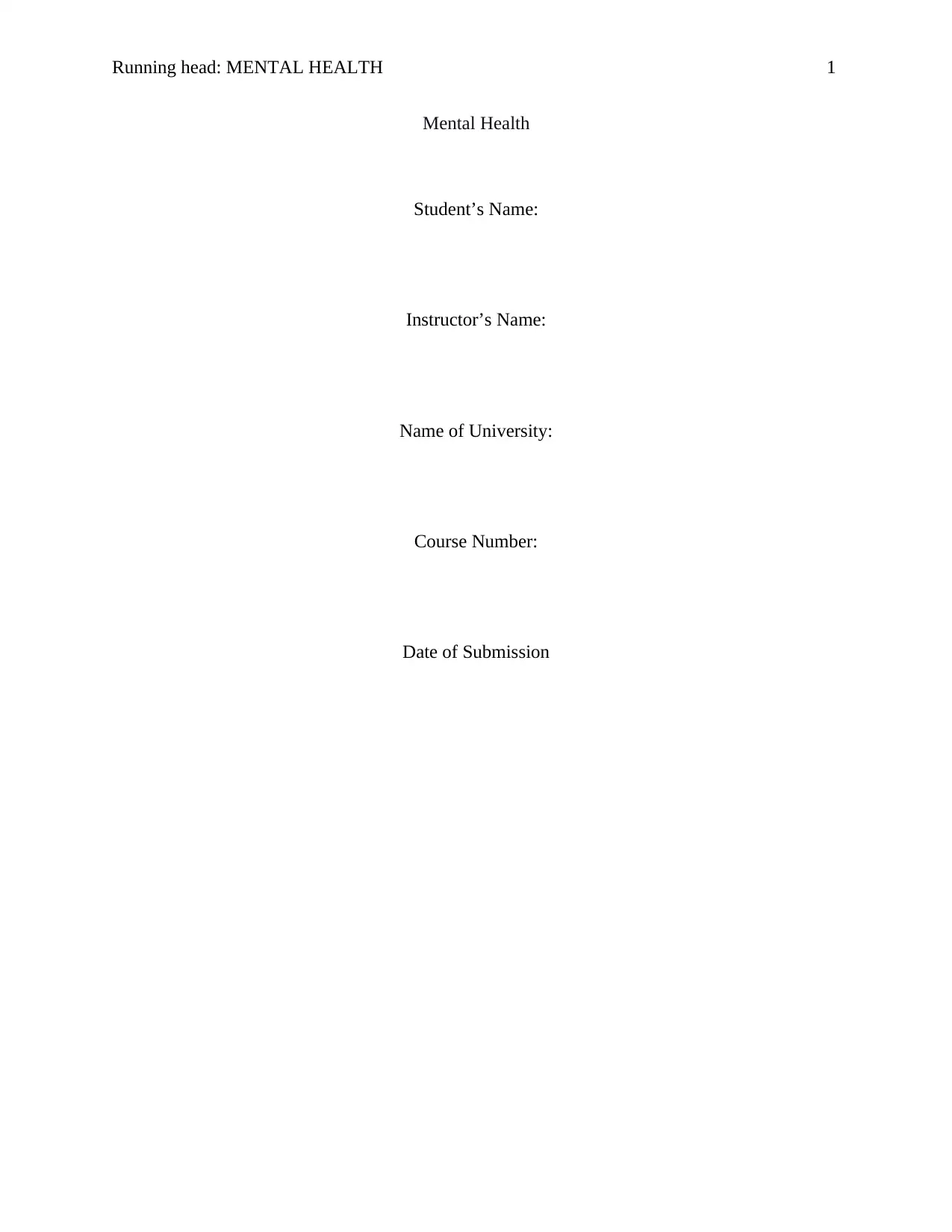
Running head: MENTAL HEALTH 1
Mental Health
Student’s Name:
Instructor’s Name:
Name of University:
Course Number:
Date of Submission
Mental Health
Student’s Name:
Instructor’s Name:
Name of University:
Course Number:
Date of Submission
Paraphrase This Document
Need a fresh take? Get an instant paraphrase of this document with our AI Paraphraser
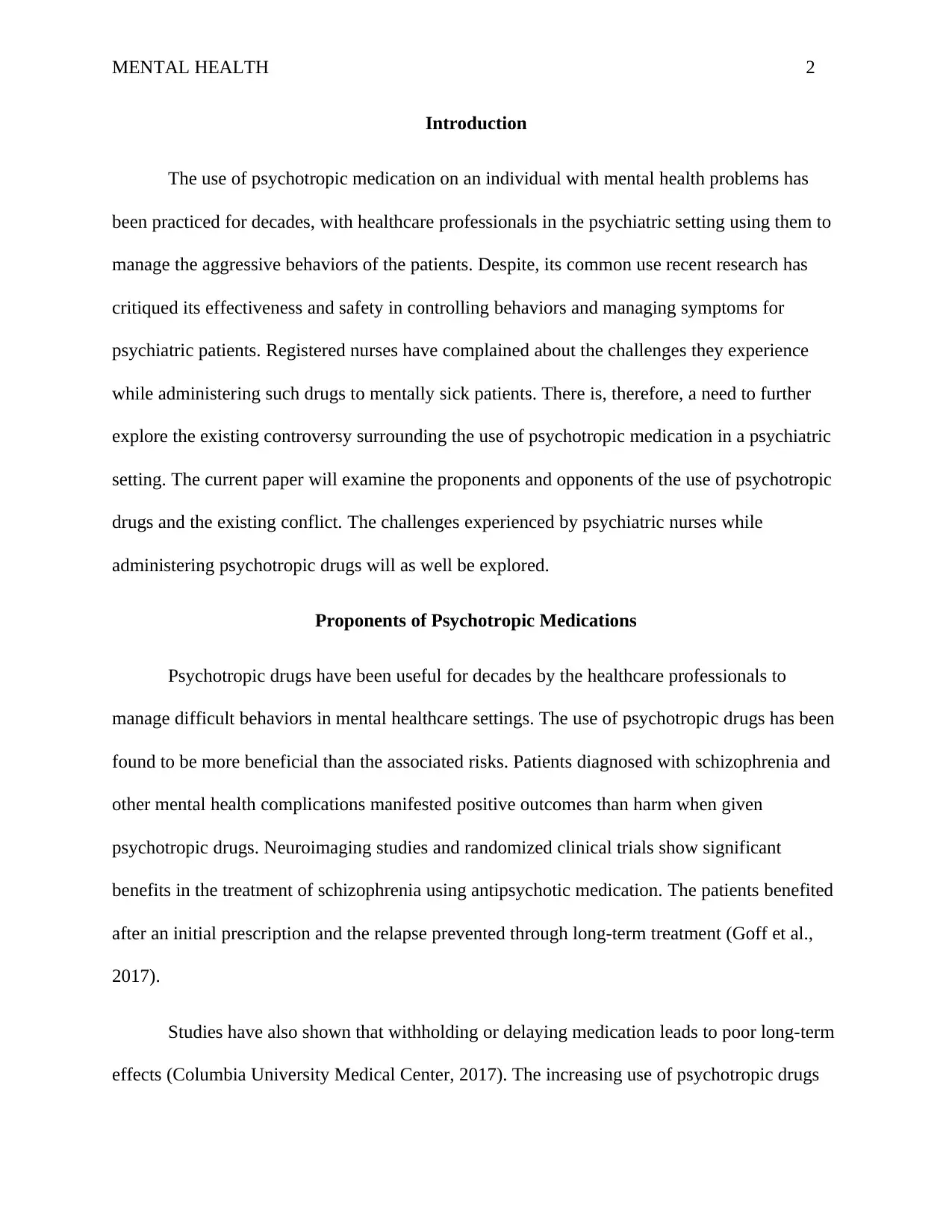
MENTAL HEALTH 2
Introduction
The use of psychotropic medication on an individual with mental health problems has
been practiced for decades, with healthcare professionals in the psychiatric setting using them to
manage the aggressive behaviors of the patients. Despite, its common use recent research has
critiqued its effectiveness and safety in controlling behaviors and managing symptoms for
psychiatric patients. Registered nurses have complained about the challenges they experience
while administering such drugs to mentally sick patients. There is, therefore, a need to further
explore the existing controversy surrounding the use of psychotropic medication in a psychiatric
setting. The current paper will examine the proponents and opponents of the use of psychotropic
drugs and the existing conflict. The challenges experienced by psychiatric nurses while
administering psychotropic drugs will as well be explored.
Proponents of Psychotropic Medications
Psychotropic drugs have been useful for decades by the healthcare professionals to
manage difficult behaviors in mental healthcare settings. The use of psychotropic drugs has been
found to be more beneficial than the associated risks. Patients diagnosed with schizophrenia and
other mental health complications manifested positive outcomes than harm when given
psychotropic drugs. Neuroimaging studies and randomized clinical trials show significant
benefits in the treatment of schizophrenia using antipsychotic medication. The patients benefited
after an initial prescription and the relapse prevented through long-term treatment (Goff et al.,
2017).
Studies have also shown that withholding or delaying medication leads to poor long-term
effects (Columbia University Medical Center, 2017). The increasing use of psychotropic drugs
Introduction
The use of psychotropic medication on an individual with mental health problems has
been practiced for decades, with healthcare professionals in the psychiatric setting using them to
manage the aggressive behaviors of the patients. Despite, its common use recent research has
critiqued its effectiveness and safety in controlling behaviors and managing symptoms for
psychiatric patients. Registered nurses have complained about the challenges they experience
while administering such drugs to mentally sick patients. There is, therefore, a need to further
explore the existing controversy surrounding the use of psychotropic medication in a psychiatric
setting. The current paper will examine the proponents and opponents of the use of psychotropic
drugs and the existing conflict. The challenges experienced by psychiatric nurses while
administering psychotropic drugs will as well be explored.
Proponents of Psychotropic Medications
Psychotropic drugs have been useful for decades by the healthcare professionals to
manage difficult behaviors in mental healthcare settings. The use of psychotropic drugs has been
found to be more beneficial than the associated risks. Patients diagnosed with schizophrenia and
other mental health complications manifested positive outcomes than harm when given
psychotropic drugs. Neuroimaging studies and randomized clinical trials show significant
benefits in the treatment of schizophrenia using antipsychotic medication. The patients benefited
after an initial prescription and the relapse prevented through long-term treatment (Goff et al.,
2017).
Studies have also shown that withholding or delaying medication leads to poor long-term
effects (Columbia University Medical Center, 2017). The increasing use of psychotropic drugs
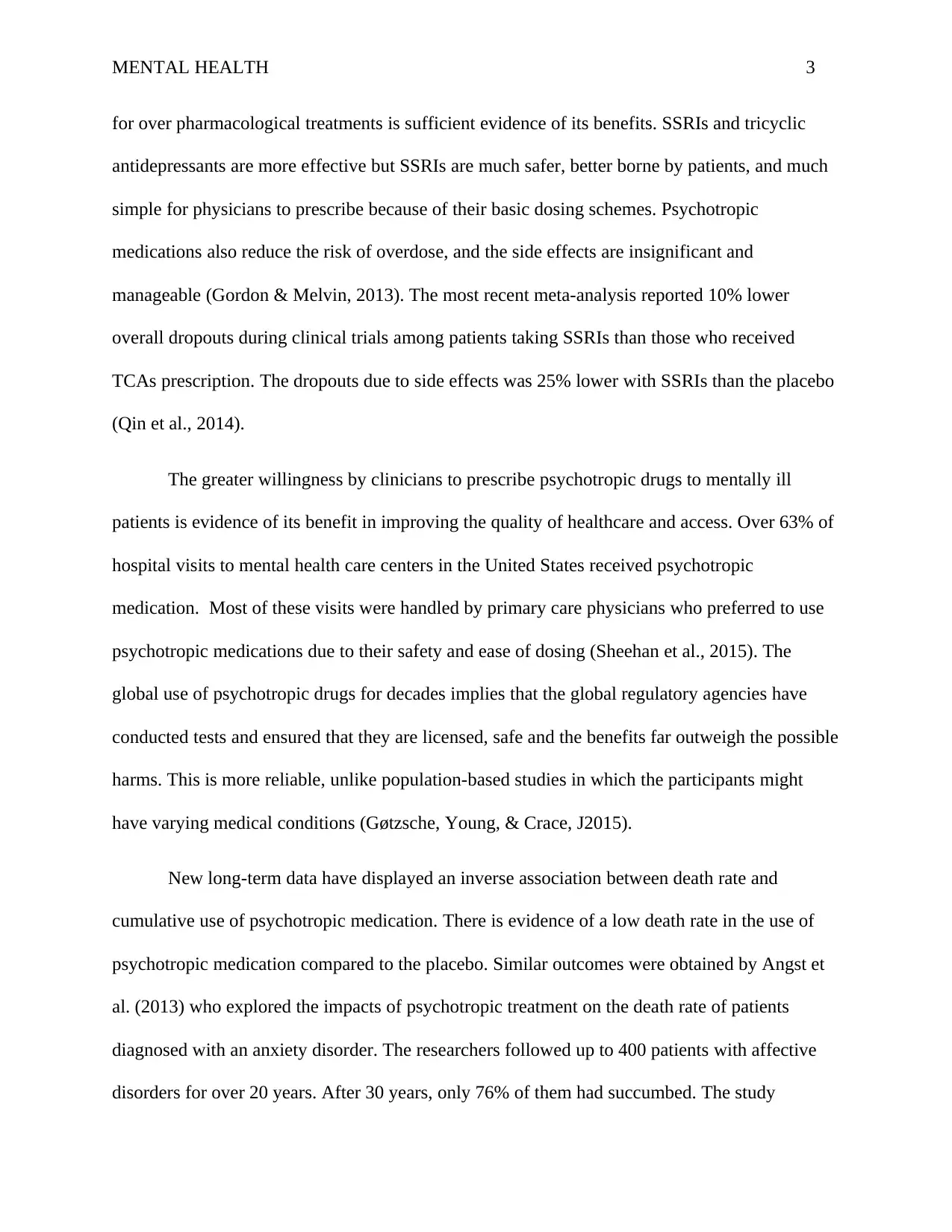
MENTAL HEALTH 3
for over pharmacological treatments is sufficient evidence of its benefits. SSRIs and tricyclic
antidepressants are more effective but SSRIs are much safer, better borne by patients, and much
simple for physicians to prescribe because of their basic dosing schemes. Psychotropic
medications also reduce the risk of overdose, and the side effects are insignificant and
manageable (Gordon & Melvin, 2013). The most recent meta-analysis reported 10% lower
overall dropouts during clinical trials among patients taking SSRIs than those who received
TCAs prescription. The dropouts due to side effects was 25% lower with SSRIs than the placebo
(Qin et al., 2014).
The greater willingness by clinicians to prescribe psychotropic drugs to mentally ill
patients is evidence of its benefit in improving the quality of healthcare and access. Over 63% of
hospital visits to mental health care centers in the United States received psychotropic
medication. Most of these visits were handled by primary care physicians who preferred to use
psychotropic medications due to their safety and ease of dosing (Sheehan et al., 2015). The
global use of psychotropic drugs for decades implies that the global regulatory agencies have
conducted tests and ensured that they are licensed, safe and the benefits far outweigh the possible
harms. This is more reliable, unlike population-based studies in which the participants might
have varying medical conditions (Gøtzsche, Young, & Crace, J2015).
New long-term data have displayed an inverse association between death rate and
cumulative use of psychotropic medication. There is evidence of a low death rate in the use of
psychotropic medication compared to the placebo. Similar outcomes were obtained by Angst et
al. (2013) who explored the impacts of psychotropic treatment on the death rate of patients
diagnosed with an anxiety disorder. The researchers followed up to 400 patients with affective
disorders for over 20 years. After 30 years, only 76% of them had succumbed. The study
for over pharmacological treatments is sufficient evidence of its benefits. SSRIs and tricyclic
antidepressants are more effective but SSRIs are much safer, better borne by patients, and much
simple for physicians to prescribe because of their basic dosing schemes. Psychotropic
medications also reduce the risk of overdose, and the side effects are insignificant and
manageable (Gordon & Melvin, 2013). The most recent meta-analysis reported 10% lower
overall dropouts during clinical trials among patients taking SSRIs than those who received
TCAs prescription. The dropouts due to side effects was 25% lower with SSRIs than the placebo
(Qin et al., 2014).
The greater willingness by clinicians to prescribe psychotropic drugs to mentally ill
patients is evidence of its benefit in improving the quality of healthcare and access. Over 63% of
hospital visits to mental health care centers in the United States received psychotropic
medication. Most of these visits were handled by primary care physicians who preferred to use
psychotropic medications due to their safety and ease of dosing (Sheehan et al., 2015). The
global use of psychotropic drugs for decades implies that the global regulatory agencies have
conducted tests and ensured that they are licensed, safe and the benefits far outweigh the possible
harms. This is more reliable, unlike population-based studies in which the participants might
have varying medical conditions (Gøtzsche, Young, & Crace, J2015).
New long-term data have displayed an inverse association between death rate and
cumulative use of psychotropic medication. There is evidence of a low death rate in the use of
psychotropic medication compared to the placebo. Similar outcomes were obtained by Angst et
al. (2013) who explored the impacts of psychotropic treatment on the death rate of patients
diagnosed with an anxiety disorder. The researchers followed up to 400 patients with affective
disorders for over 20 years. After 30 years, only 76% of them had succumbed. The study
⊘ This is a preview!⊘
Do you want full access?
Subscribe today to unlock all pages.

Trusted by 1+ million students worldwide
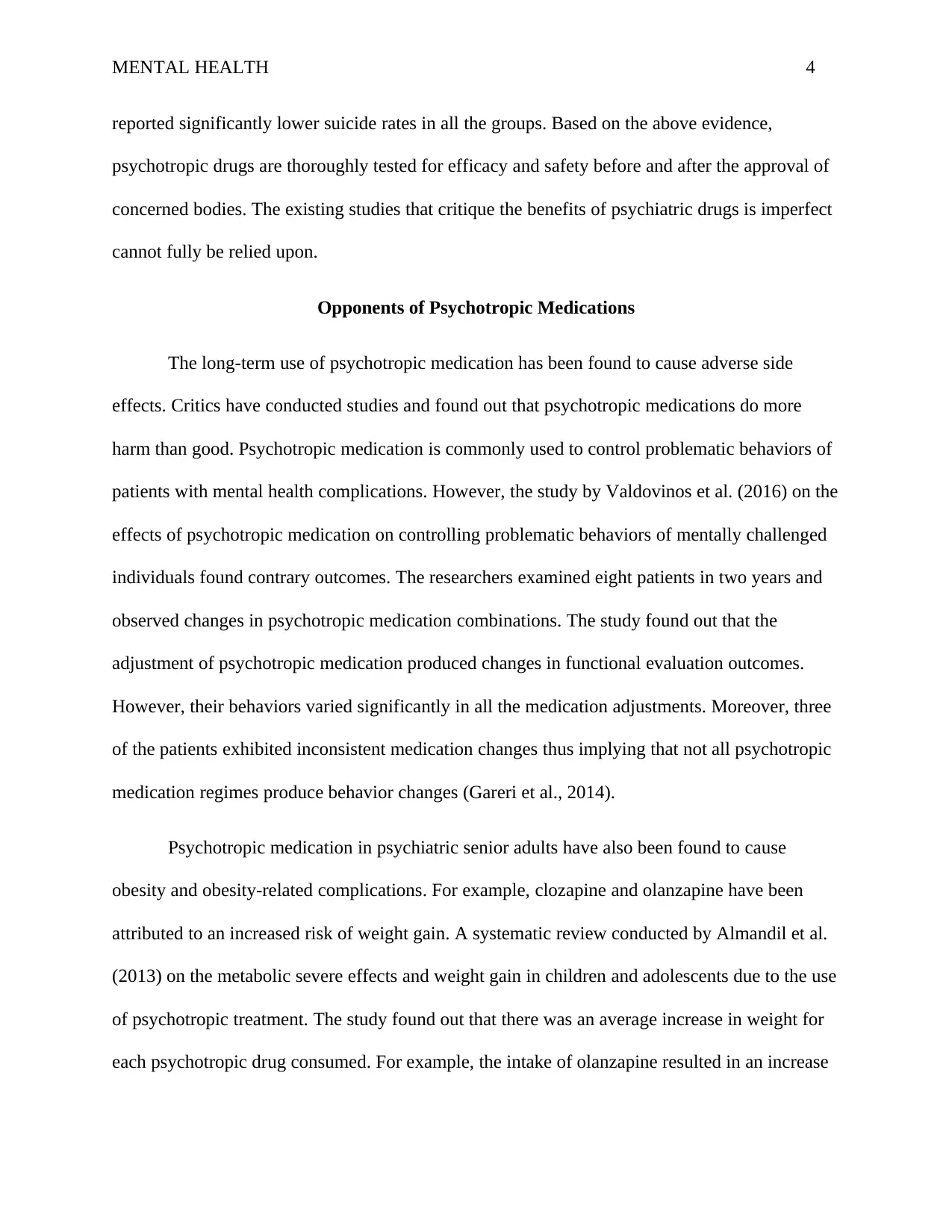
MENTAL HEALTH 4
reported significantly lower suicide rates in all the groups. Based on the above evidence,
psychotropic drugs are thoroughly tested for efficacy and safety before and after the approval of
concerned bodies. The existing studies that critique the benefits of psychiatric drugs is imperfect
cannot fully be relied upon.
Opponents of Psychotropic Medications
The long-term use of psychotropic medication has been found to cause adverse side
effects. Critics have conducted studies and found out that psychotropic medications do more
harm than good. Psychotropic medication is commonly used to control problematic behaviors of
patients with mental health complications. However, the study by Valdovinos et al. (2016) on the
effects of psychotropic medication on controlling problematic behaviors of mentally challenged
individuals found contrary outcomes. The researchers examined eight patients in two years and
observed changes in psychotropic medication combinations. The study found out that the
adjustment of psychotropic medication produced changes in functional evaluation outcomes.
However, their behaviors varied significantly in all the medication adjustments. Moreover, three
of the patients exhibited inconsistent medication changes thus implying that not all psychotropic
medication regimes produce behavior changes (Gareri et al., 2014).
Psychotropic medication in psychiatric senior adults have also been found to cause
obesity and obesity-related complications. For example, clozapine and olanzapine have been
attributed to an increased risk of weight gain. A systematic review conducted by Almandil et al.
(2013) on the metabolic severe effects and weight gain in children and adolescents due to the use
of psychotropic treatment. The study found out that there was an average increase in weight for
each psychotropic drug consumed. For example, the intake of olanzapine resulted in an increase
reported significantly lower suicide rates in all the groups. Based on the above evidence,
psychotropic drugs are thoroughly tested for efficacy and safety before and after the approval of
concerned bodies. The existing studies that critique the benefits of psychiatric drugs is imperfect
cannot fully be relied upon.
Opponents of Psychotropic Medications
The long-term use of psychotropic medication has been found to cause adverse side
effects. Critics have conducted studies and found out that psychotropic medications do more
harm than good. Psychotropic medication is commonly used to control problematic behaviors of
patients with mental health complications. However, the study by Valdovinos et al. (2016) on the
effects of psychotropic medication on controlling problematic behaviors of mentally challenged
individuals found contrary outcomes. The researchers examined eight patients in two years and
observed changes in psychotropic medication combinations. The study found out that the
adjustment of psychotropic medication produced changes in functional evaluation outcomes.
However, their behaviors varied significantly in all the medication adjustments. Moreover, three
of the patients exhibited inconsistent medication changes thus implying that not all psychotropic
medication regimes produce behavior changes (Gareri et al., 2014).
Psychotropic medication in psychiatric senior adults have also been found to cause
obesity and obesity-related complications. For example, clozapine and olanzapine have been
attributed to an increased risk of weight gain. A systematic review conducted by Almandil et al.
(2013) on the metabolic severe effects and weight gain in children and adolescents due to the use
of psychotropic treatment. The study found out that there was an average increase in weight for
each psychotropic drug consumed. For example, the intake of olanzapine resulted in an increase
Paraphrase This Document
Need a fresh take? Get an instant paraphrase of this document with our AI Paraphraser
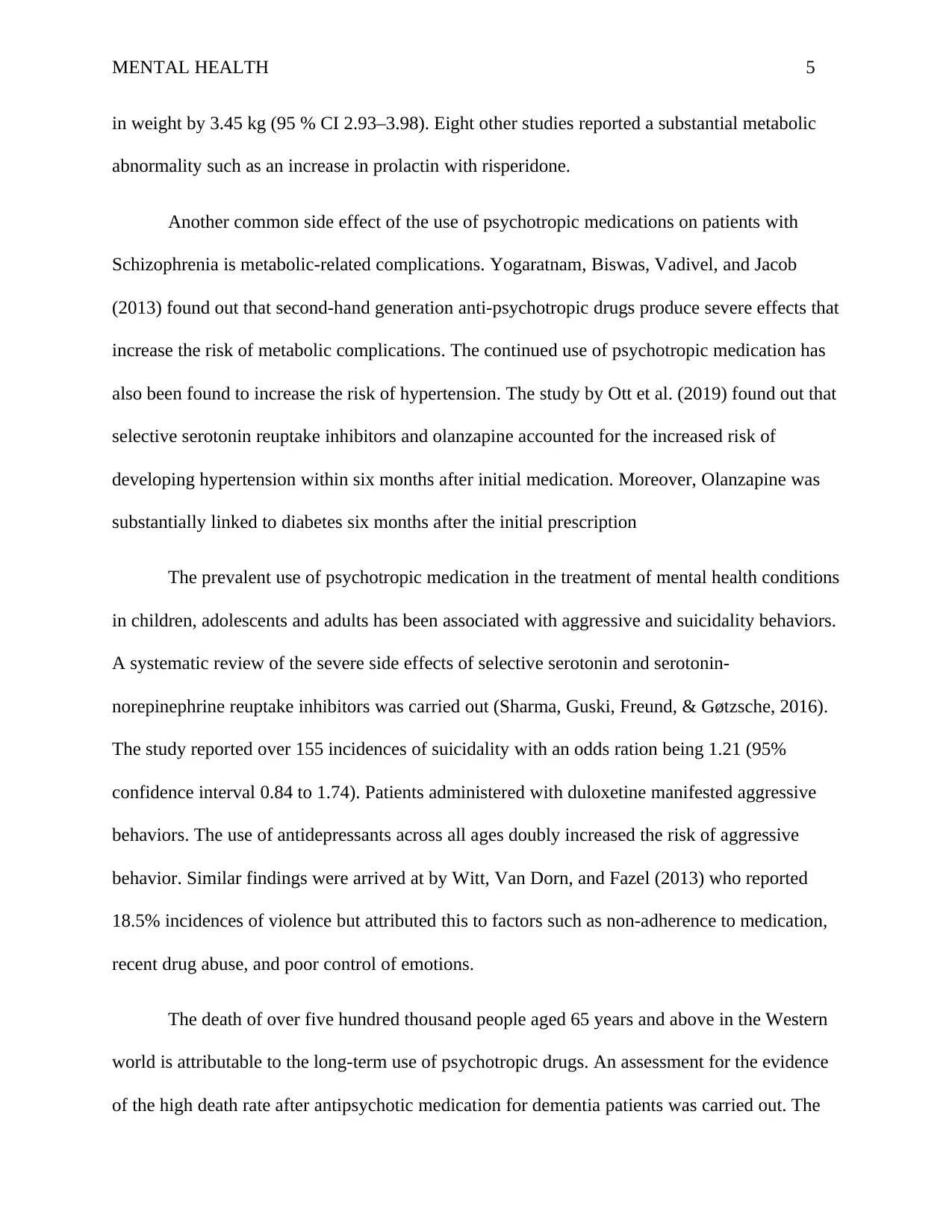
MENTAL HEALTH 5
in weight by 3.45 kg (95 % CI 2.93–3.98). Eight other studies reported a substantial metabolic
abnormality such as an increase in prolactin with risperidone.
Another common side effect of the use of psychotropic medications on patients with
Schizophrenia is metabolic-related complications. Yogaratnam, Biswas, Vadivel, and Jacob
(2013) found out that second-hand generation anti-psychotropic drugs produce severe effects that
increase the risk of metabolic complications. The continued use of psychotropic medication has
also been found to increase the risk of hypertension. The study by Ott et al. (2019) found out that
selective serotonin reuptake inhibitors and olanzapine accounted for the increased risk of
developing hypertension within six months after initial medication. Moreover, Olanzapine was
substantially linked to diabetes six months after the initial prescription
The prevalent use of psychotropic medication in the treatment of mental health conditions
in children, adolescents and adults has been associated with aggressive and suicidality behaviors.
A systematic review of the severe side effects of selective serotonin and serotonin-
norepinephrine reuptake inhibitors was carried out (Sharma, Guski, Freund, & Gøtzsche, 2016).
The study reported over 155 incidences of suicidality with an odds ration being 1.21 (95%
confidence interval 0.84 to 1.74). Patients administered with duloxetine manifested aggressive
behaviors. The use of antidepressants across all ages doubly increased the risk of aggressive
behavior. Similar findings were arrived at by Witt, Van Dorn, and Fazel (2013) who reported
18.5% incidences of violence but attributed this to factors such as non-adherence to medication,
recent drug abuse, and poor control of emotions.
The death of over five hundred thousand people aged 65 years and above in the Western
world is attributable to the long-term use of psychotropic drugs. An assessment for the evidence
of the high death rate after antipsychotic medication for dementia patients was carried out. The
in weight by 3.45 kg (95 % CI 2.93–3.98). Eight other studies reported a substantial metabolic
abnormality such as an increase in prolactin with risperidone.
Another common side effect of the use of psychotropic medications on patients with
Schizophrenia is metabolic-related complications. Yogaratnam, Biswas, Vadivel, and Jacob
(2013) found out that second-hand generation anti-psychotropic drugs produce severe effects that
increase the risk of metabolic complications. The continued use of psychotropic medication has
also been found to increase the risk of hypertension. The study by Ott et al. (2019) found out that
selective serotonin reuptake inhibitors and olanzapine accounted for the increased risk of
developing hypertension within six months after initial medication. Moreover, Olanzapine was
substantially linked to diabetes six months after the initial prescription
The prevalent use of psychotropic medication in the treatment of mental health conditions
in children, adolescents and adults has been associated with aggressive and suicidality behaviors.
A systematic review of the severe side effects of selective serotonin and serotonin-
norepinephrine reuptake inhibitors was carried out (Sharma, Guski, Freund, & Gøtzsche, 2016).
The study reported over 155 incidences of suicidality with an odds ration being 1.21 (95%
confidence interval 0.84 to 1.74). Patients administered with duloxetine manifested aggressive
behaviors. The use of antidepressants across all ages doubly increased the risk of aggressive
behavior. Similar findings were arrived at by Witt, Van Dorn, and Fazel (2013) who reported
18.5% incidences of violence but attributed this to factors such as non-adherence to medication,
recent drug abuse, and poor control of emotions.
The death of over five hundred thousand people aged 65 years and above in the Western
world is attributable to the long-term use of psychotropic drugs. An assessment for the evidence
of the high death rate after antipsychotic medication for dementia patients was carried out. The
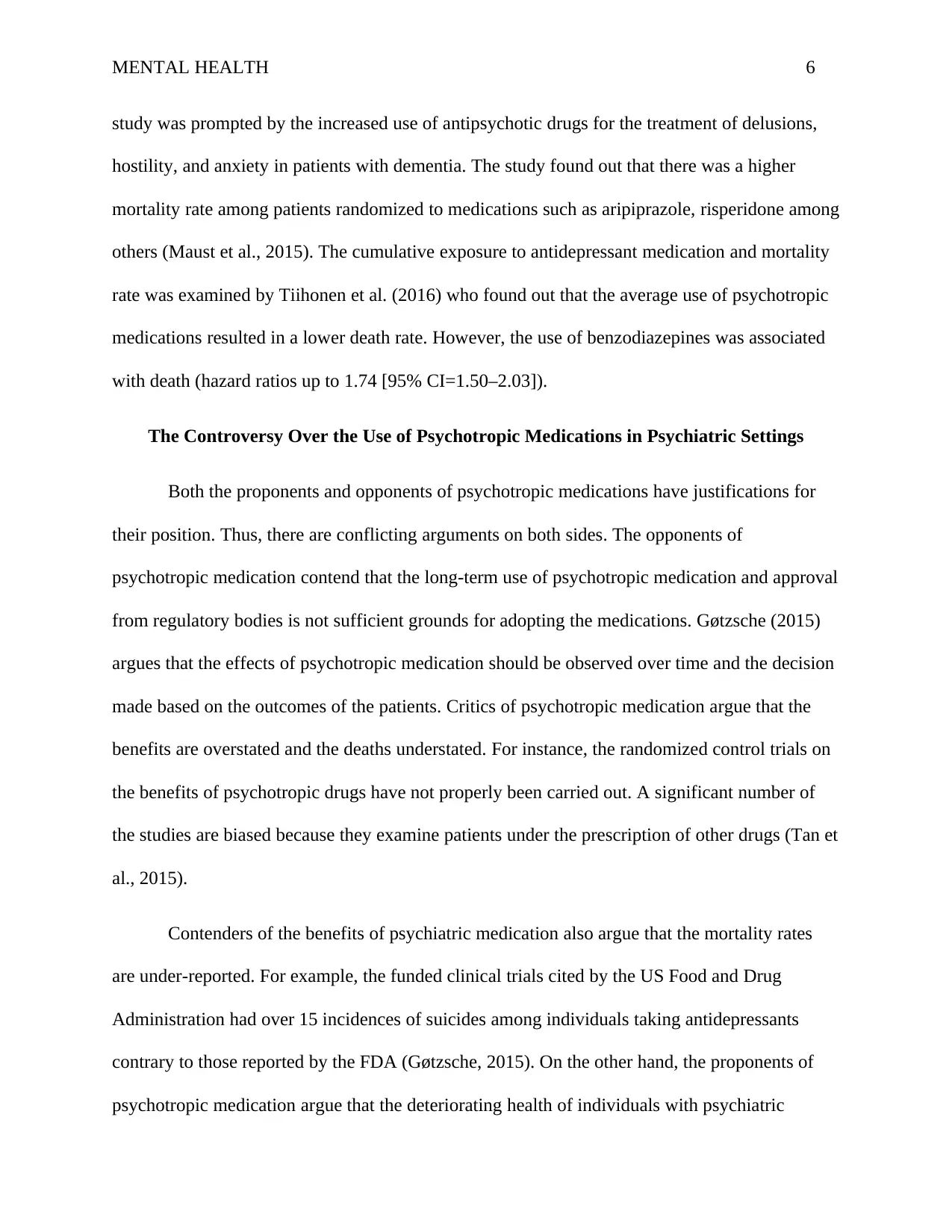
MENTAL HEALTH 6
study was prompted by the increased use of antipsychotic drugs for the treatment of delusions,
hostility, and anxiety in patients with dementia. The study found out that there was a higher
mortality rate among patients randomized to medications such as aripiprazole, risperidone among
others (Maust et al., 2015). The cumulative exposure to antidepressant medication and mortality
rate was examined by Tiihonen et al. (2016) who found out that the average use of psychotropic
medications resulted in a lower death rate. However, the use of benzodiazepines was associated
with death (hazard ratios up to 1.74 [95% CI=1.50–2.03]).
The Controversy Over the Use of Psychotropic Medications in Psychiatric Settings
Both the proponents and opponents of psychotropic medications have justifications for
their position. Thus, there are conflicting arguments on both sides. The opponents of
psychotropic medication contend that the long-term use of psychotropic medication and approval
from regulatory bodies is not sufficient grounds for adopting the medications. Gøtzsche (2015)
argues that the effects of psychotropic medication should be observed over time and the decision
made based on the outcomes of the patients. Critics of psychotropic medication argue that the
benefits are overstated and the deaths understated. For instance, the randomized control trials on
the benefits of psychotropic drugs have not properly been carried out. A significant number of
the studies are biased because they examine patients under the prescription of other drugs (Tan et
al., 2015).
Contenders of the benefits of psychiatric medication also argue that the mortality rates
are under-reported. For example, the funded clinical trials cited by the US Food and Drug
Administration had over 15 incidences of suicides among individuals taking antidepressants
contrary to those reported by the FDA (Gøtzsche, 2015). On the other hand, the proponents of
psychotropic medication argue that the deteriorating health of individuals with psychiatric
study was prompted by the increased use of antipsychotic drugs for the treatment of delusions,
hostility, and anxiety in patients with dementia. The study found out that there was a higher
mortality rate among patients randomized to medications such as aripiprazole, risperidone among
others (Maust et al., 2015). The cumulative exposure to antidepressant medication and mortality
rate was examined by Tiihonen et al. (2016) who found out that the average use of psychotropic
medications resulted in a lower death rate. However, the use of benzodiazepines was associated
with death (hazard ratios up to 1.74 [95% CI=1.50–2.03]).
The Controversy Over the Use of Psychotropic Medications in Psychiatric Settings
Both the proponents and opponents of psychotropic medications have justifications for
their position. Thus, there are conflicting arguments on both sides. The opponents of
psychotropic medication contend that the long-term use of psychotropic medication and approval
from regulatory bodies is not sufficient grounds for adopting the medications. Gøtzsche (2015)
argues that the effects of psychotropic medication should be observed over time and the decision
made based on the outcomes of the patients. Critics of psychotropic medication argue that the
benefits are overstated and the deaths understated. For instance, the randomized control trials on
the benefits of psychotropic drugs have not properly been carried out. A significant number of
the studies are biased because they examine patients under the prescription of other drugs (Tan et
al., 2015).
Contenders of the benefits of psychiatric medication also argue that the mortality rates
are under-reported. For example, the funded clinical trials cited by the US Food and Drug
Administration had over 15 incidences of suicides among individuals taking antidepressants
contrary to those reported by the FDA (Gøtzsche, 2015). On the other hand, the proponents of
psychotropic medication argue that the deteriorating health of individuals with psychiatric
⊘ This is a preview!⊘
Do you want full access?
Subscribe today to unlock all pages.

Trusted by 1+ million students worldwide
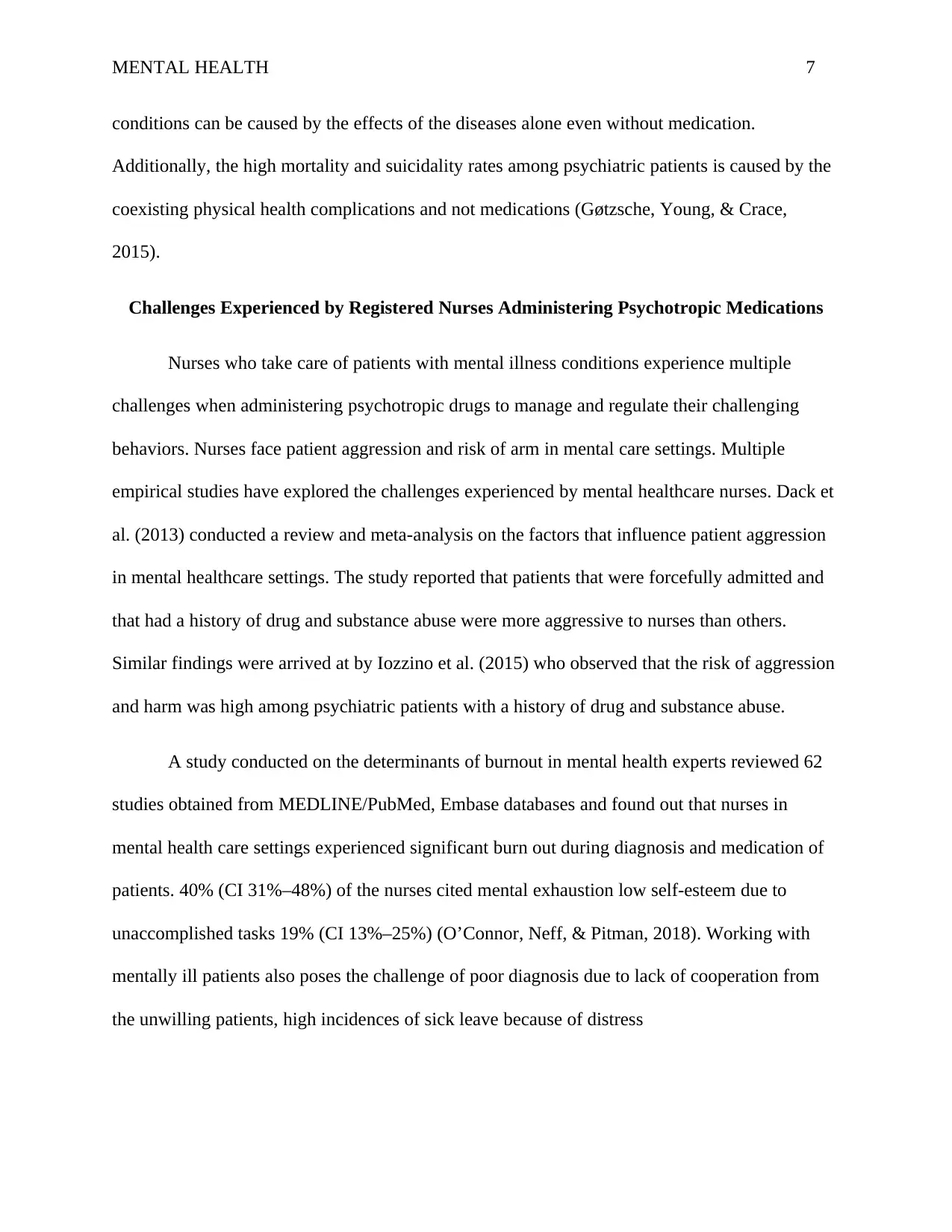
MENTAL HEALTH 7
conditions can be caused by the effects of the diseases alone even without medication.
Additionally, the high mortality and suicidality rates among psychiatric patients is caused by the
coexisting physical health complications and not medications (Gøtzsche, Young, & Crace,
2015).
Challenges Experienced by Registered Nurses Administering Psychotropic Medications
Nurses who take care of patients with mental illness conditions experience multiple
challenges when administering psychotropic drugs to manage and regulate their challenging
behaviors. Nurses face patient aggression and risk of arm in mental care settings. Multiple
empirical studies have explored the challenges experienced by mental healthcare nurses. Dack et
al. (2013) conducted a review and meta-analysis on the factors that influence patient aggression
in mental healthcare settings. The study reported that patients that were forcefully admitted and
that had a history of drug and substance abuse were more aggressive to nurses than others.
Similar findings were arrived at by Iozzino et al. (2015) who observed that the risk of aggression
and harm was high among psychiatric patients with a history of drug and substance abuse.
A study conducted on the determinants of burnout in mental health experts reviewed 62
studies obtained from MEDLINE/PubMed, Embase databases and found out that nurses in
mental health care settings experienced significant burn out during diagnosis and medication of
patients. 40% (CI 31%–48%) of the nurses cited mental exhaustion low self-esteem due to
unaccomplished tasks 19% (CI 13%–25%) (O’Connor, Neff, & Pitman, 2018). Working with
mentally ill patients also poses the challenge of poor diagnosis due to lack of cooperation from
the unwilling patients, high incidences of sick leave because of distress
conditions can be caused by the effects of the diseases alone even without medication.
Additionally, the high mortality and suicidality rates among psychiatric patients is caused by the
coexisting physical health complications and not medications (Gøtzsche, Young, & Crace,
2015).
Challenges Experienced by Registered Nurses Administering Psychotropic Medications
Nurses who take care of patients with mental illness conditions experience multiple
challenges when administering psychotropic drugs to manage and regulate their challenging
behaviors. Nurses face patient aggression and risk of arm in mental care settings. Multiple
empirical studies have explored the challenges experienced by mental healthcare nurses. Dack et
al. (2013) conducted a review and meta-analysis on the factors that influence patient aggression
in mental healthcare settings. The study reported that patients that were forcefully admitted and
that had a history of drug and substance abuse were more aggressive to nurses than others.
Similar findings were arrived at by Iozzino et al. (2015) who observed that the risk of aggression
and harm was high among psychiatric patients with a history of drug and substance abuse.
A study conducted on the determinants of burnout in mental health experts reviewed 62
studies obtained from MEDLINE/PubMed, Embase databases and found out that nurses in
mental health care settings experienced significant burn out during diagnosis and medication of
patients. 40% (CI 31%–48%) of the nurses cited mental exhaustion low self-esteem due to
unaccomplished tasks 19% (CI 13%–25%) (O’Connor, Neff, & Pitman, 2018). Working with
mentally ill patients also poses the challenge of poor diagnosis due to lack of cooperation from
the unwilling patients, high incidences of sick leave because of distress
Paraphrase This Document
Need a fresh take? Get an instant paraphrase of this document with our AI Paraphraser
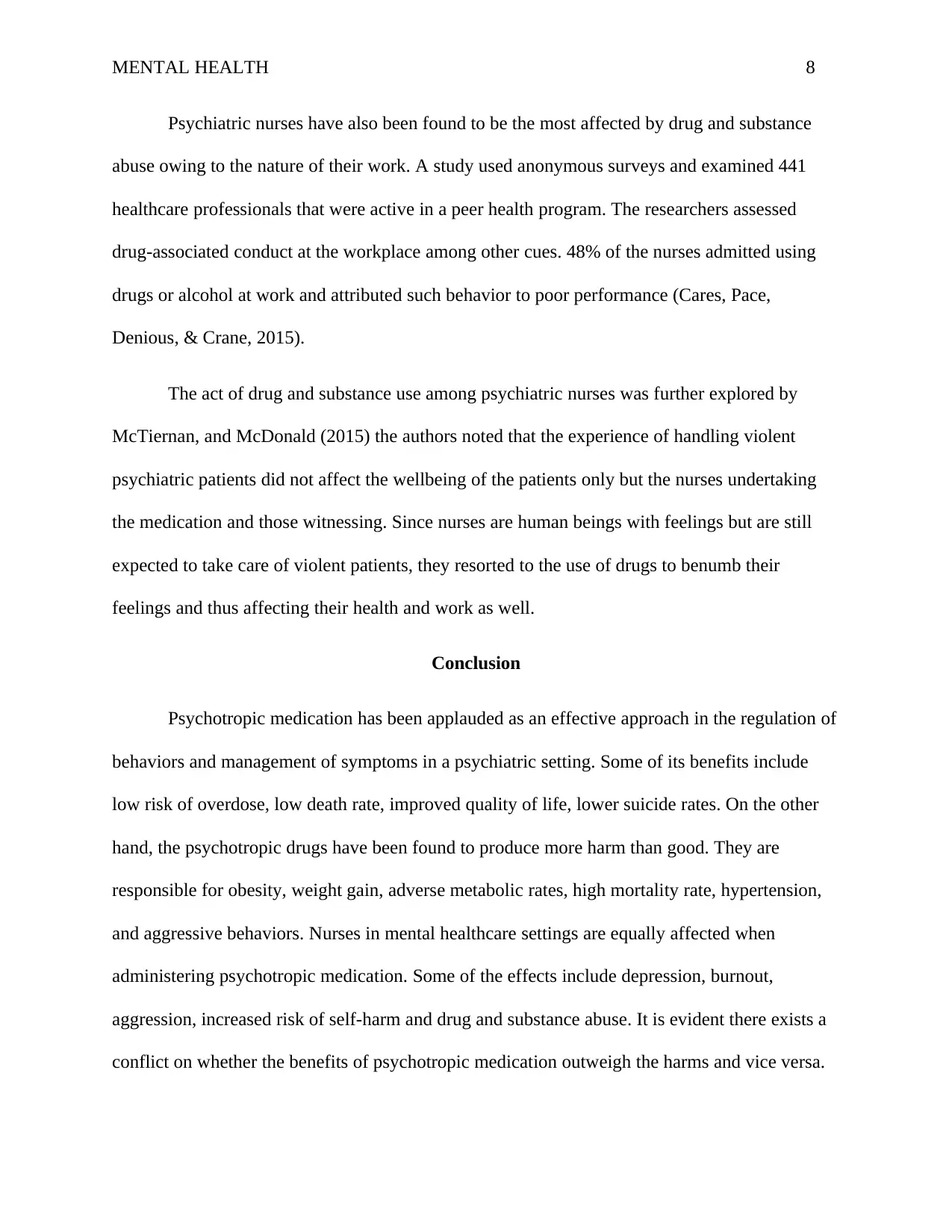
MENTAL HEALTH 8
Psychiatric nurses have also been found to be the most affected by drug and substance
abuse owing to the nature of their work. A study used anonymous surveys and examined 441
healthcare professionals that were active in a peer health program. The researchers assessed
drug-associated conduct at the workplace among other cues. 48% of the nurses admitted using
drugs or alcohol at work and attributed such behavior to poor performance (Cares, Pace,
Denious, & Crane, 2015).
The act of drug and substance use among psychiatric nurses was further explored by
McTiernan, and McDonald (2015) the authors noted that the experience of handling violent
psychiatric patients did not affect the wellbeing of the patients only but the nurses undertaking
the medication and those witnessing. Since nurses are human beings with feelings but are still
expected to take care of violent patients, they resorted to the use of drugs to benumb their
feelings and thus affecting their health and work as well.
Conclusion
Psychotropic medication has been applauded as an effective approach in the regulation of
behaviors and management of symptoms in a psychiatric setting. Some of its benefits include
low risk of overdose, low death rate, improved quality of life, lower suicide rates. On the other
hand, the psychotropic drugs have been found to produce more harm than good. They are
responsible for obesity, weight gain, adverse metabolic rates, high mortality rate, hypertension,
and aggressive behaviors. Nurses in mental healthcare settings are equally affected when
administering psychotropic medication. Some of the effects include depression, burnout,
aggression, increased risk of self-harm and drug and substance abuse. It is evident there exists a
conflict on whether the benefits of psychotropic medication outweigh the harms and vice versa.
Psychiatric nurses have also been found to be the most affected by drug and substance
abuse owing to the nature of their work. A study used anonymous surveys and examined 441
healthcare professionals that were active in a peer health program. The researchers assessed
drug-associated conduct at the workplace among other cues. 48% of the nurses admitted using
drugs or alcohol at work and attributed such behavior to poor performance (Cares, Pace,
Denious, & Crane, 2015).
The act of drug and substance use among psychiatric nurses was further explored by
McTiernan, and McDonald (2015) the authors noted that the experience of handling violent
psychiatric patients did not affect the wellbeing of the patients only but the nurses undertaking
the medication and those witnessing. Since nurses are human beings with feelings but are still
expected to take care of violent patients, they resorted to the use of drugs to benumb their
feelings and thus affecting their health and work as well.
Conclusion
Psychotropic medication has been applauded as an effective approach in the regulation of
behaviors and management of symptoms in a psychiatric setting. Some of its benefits include
low risk of overdose, low death rate, improved quality of life, lower suicide rates. On the other
hand, the psychotropic drugs have been found to produce more harm than good. They are
responsible for obesity, weight gain, adverse metabolic rates, high mortality rate, hypertension,
and aggressive behaviors. Nurses in mental healthcare settings are equally affected when
administering psychotropic medication. Some of the effects include depression, burnout,
aggression, increased risk of self-harm and drug and substance abuse. It is evident there exists a
conflict on whether the benefits of psychotropic medication outweigh the harms and vice versa.

MENTAL HEALTH 9
There is, therefore, a need for more thorough research on the same so as to decide on whether to
continue using the drugs or to discard them completely and find another alternative.
There is, therefore, a need for more thorough research on the same so as to decide on whether to
continue using the drugs or to discard them completely and find another alternative.
⊘ This is a preview!⊘
Do you want full access?
Subscribe today to unlock all pages.

Trusted by 1+ million students worldwide
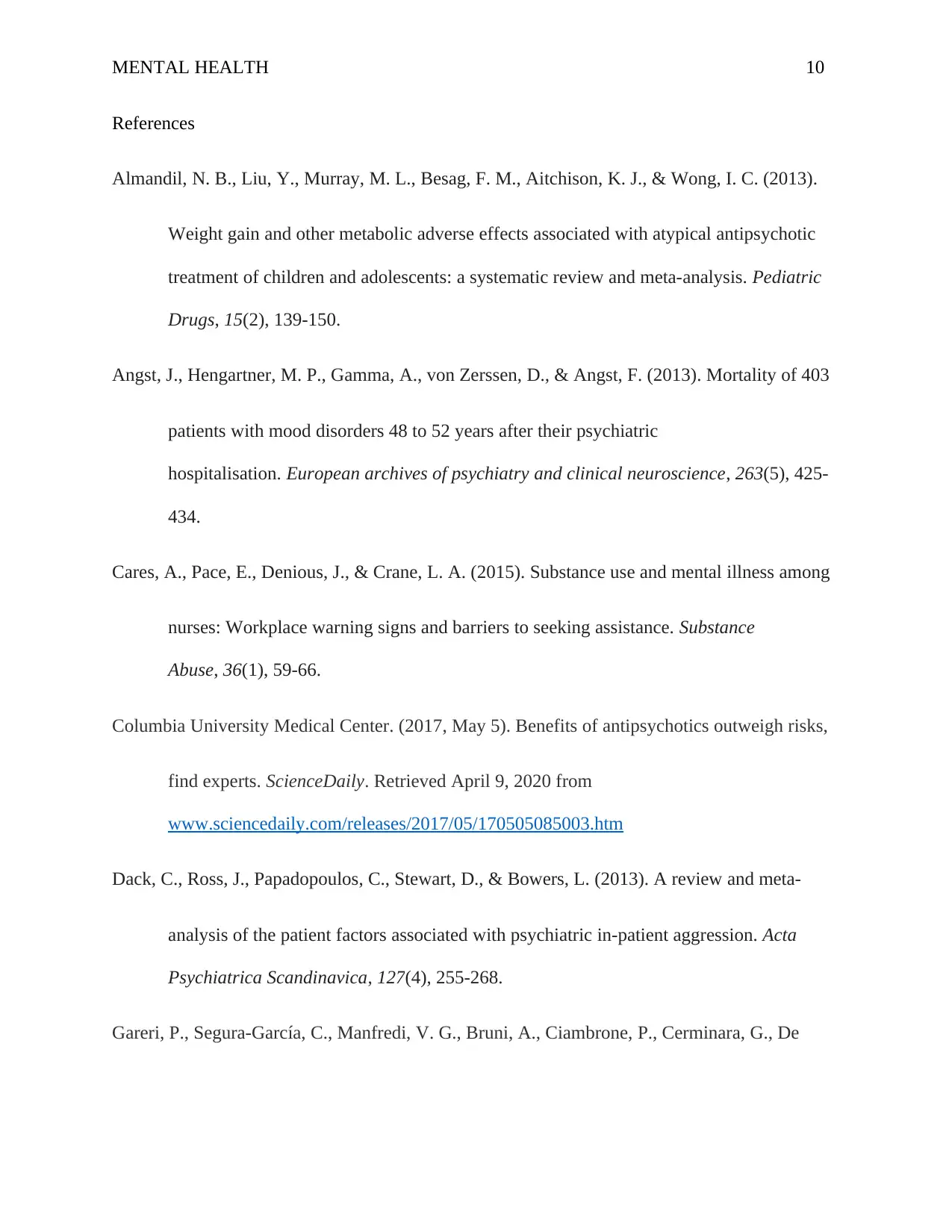
MENTAL HEALTH 10
References
Almandil, N. B., Liu, Y., Murray, M. L., Besag, F. M., Aitchison, K. J., & Wong, I. C. (2013).
Weight gain and other metabolic adverse effects associated with atypical antipsychotic
treatment of children and adolescents: a systematic review and meta-analysis. Pediatric
Drugs, 15(2), 139-150.
Angst, J., Hengartner, M. P., Gamma, A., von Zerssen, D., & Angst, F. (2013). Mortality of 403
patients with mood disorders 48 to 52 years after their psychiatric
hospitalisation. European archives of psychiatry and clinical neuroscience, 263(5), 425-
434.
Cares, A., Pace, E., Denious, J., & Crane, L. A. (2015). Substance use and mental illness among
nurses: Workplace warning signs and barriers to seeking assistance. Substance
Abuse, 36(1), 59-66.
Columbia University Medical Center. (2017, May 5). Benefits of antipsychotics outweigh risks,
find experts. ScienceDaily. Retrieved April 9, 2020 from
www.sciencedaily.com/releases/2017/05/170505085003.htm
Dack, C., Ross, J., Papadopoulos, C., Stewart, D., & Bowers, L. (2013). A review and meta‐
analysis of the patient factors associated with psychiatric in‐patient aggression. Acta
Psychiatrica Scandinavica, 127(4), 255-268.
Gareri, P., Segura-García, C., Manfredi, V. G., Bruni, A., Ciambrone, P., Cerminara, G., De
References
Almandil, N. B., Liu, Y., Murray, M. L., Besag, F. M., Aitchison, K. J., & Wong, I. C. (2013).
Weight gain and other metabolic adverse effects associated with atypical antipsychotic
treatment of children and adolescents: a systematic review and meta-analysis. Pediatric
Drugs, 15(2), 139-150.
Angst, J., Hengartner, M. P., Gamma, A., von Zerssen, D., & Angst, F. (2013). Mortality of 403
patients with mood disorders 48 to 52 years after their psychiatric
hospitalisation. European archives of psychiatry and clinical neuroscience, 263(5), 425-
434.
Cares, A., Pace, E., Denious, J., & Crane, L. A. (2015). Substance use and mental illness among
nurses: Workplace warning signs and barriers to seeking assistance. Substance
Abuse, 36(1), 59-66.
Columbia University Medical Center. (2017, May 5). Benefits of antipsychotics outweigh risks,
find experts. ScienceDaily. Retrieved April 9, 2020 from
www.sciencedaily.com/releases/2017/05/170505085003.htm
Dack, C., Ross, J., Papadopoulos, C., Stewart, D., & Bowers, L. (2013). A review and meta‐
analysis of the patient factors associated with psychiatric in‐patient aggression. Acta
Psychiatrica Scandinavica, 127(4), 255-268.
Gareri, P., Segura-García, C., Manfredi, V. G., Bruni, A., Ciambrone, P., Cerminara, G., De
Paraphrase This Document
Need a fresh take? Get an instant paraphrase of this document with our AI Paraphraser
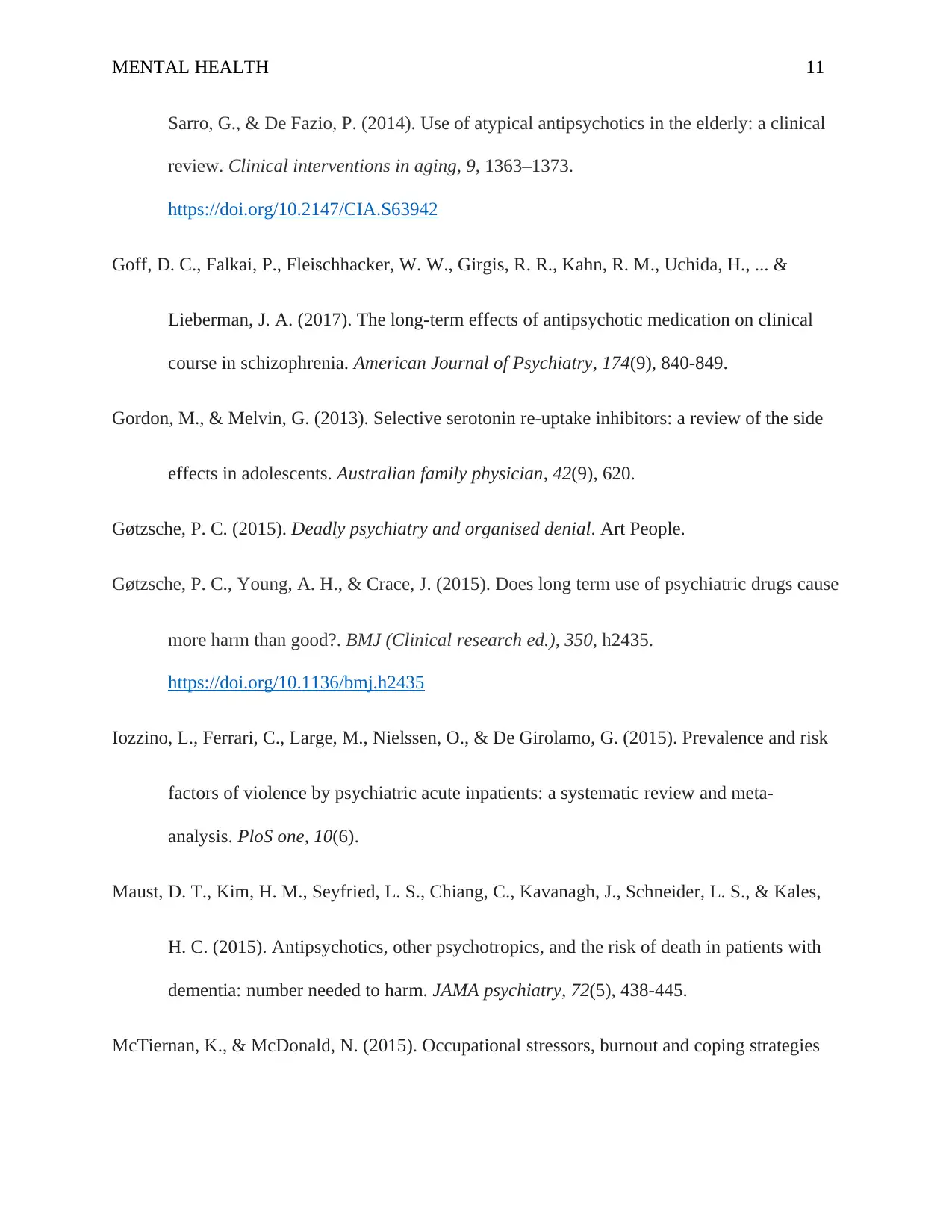
MENTAL HEALTH 11
Sarro, G., & De Fazio, P. (2014). Use of atypical antipsychotics in the elderly: a clinical
review. Clinical interventions in aging, 9, 1363–1373.
https://doi.org/10.2147/CIA.S63942
Goff, D. C., Falkai, P., Fleischhacker, W. W., Girgis, R. R., Kahn, R. M., Uchida, H., ... &
Lieberman, J. A. (2017). The long-term effects of antipsychotic medication on clinical
course in schizophrenia. American Journal of Psychiatry, 174(9), 840-849.
Gordon, M., & Melvin, G. (2013). Selective serotonin re-uptake inhibitors: a review of the side
effects in adolescents. Australian family physician, 42(9), 620.
Gøtzsche, P. C. (2015). Deadly psychiatry and organised denial. Art People.
Gøtzsche, P. C., Young, A. H., & Crace, J. (2015). Does long term use of psychiatric drugs cause
more harm than good?. BMJ (Clinical research ed.), 350, h2435.
https://doi.org/10.1136/bmj.h2435
Iozzino, L., Ferrari, C., Large, M., Nielssen, O., & De Girolamo, G. (2015). Prevalence and risk
factors of violence by psychiatric acute inpatients: a systematic review and meta-
analysis. PloS one, 10(6).
Maust, D. T., Kim, H. M., Seyfried, L. S., Chiang, C., Kavanagh, J., Schneider, L. S., & Kales,
H. C. (2015). Antipsychotics, other psychotropics, and the risk of death in patients with
dementia: number needed to harm. JAMA psychiatry, 72(5), 438-445.
McTiernan, K., & McDonald, N. (2015). Occupational stressors, burnout and coping strategies
Sarro, G., & De Fazio, P. (2014). Use of atypical antipsychotics in the elderly: a clinical
review. Clinical interventions in aging, 9, 1363–1373.
https://doi.org/10.2147/CIA.S63942
Goff, D. C., Falkai, P., Fleischhacker, W. W., Girgis, R. R., Kahn, R. M., Uchida, H., ... &
Lieberman, J. A. (2017). The long-term effects of antipsychotic medication on clinical
course in schizophrenia. American Journal of Psychiatry, 174(9), 840-849.
Gordon, M., & Melvin, G. (2013). Selective serotonin re-uptake inhibitors: a review of the side
effects in adolescents. Australian family physician, 42(9), 620.
Gøtzsche, P. C. (2015). Deadly psychiatry and organised denial. Art People.
Gøtzsche, P. C., Young, A. H., & Crace, J. (2015). Does long term use of psychiatric drugs cause
more harm than good?. BMJ (Clinical research ed.), 350, h2435.
https://doi.org/10.1136/bmj.h2435
Iozzino, L., Ferrari, C., Large, M., Nielssen, O., & De Girolamo, G. (2015). Prevalence and risk
factors of violence by psychiatric acute inpatients: a systematic review and meta-
analysis. PloS one, 10(6).
Maust, D. T., Kim, H. M., Seyfried, L. S., Chiang, C., Kavanagh, J., Schneider, L. S., & Kales,
H. C. (2015). Antipsychotics, other psychotropics, and the risk of death in patients with
dementia: number needed to harm. JAMA psychiatry, 72(5), 438-445.
McTiernan, K., & McDonald, N. (2015). Occupational stressors, burnout and coping strategies
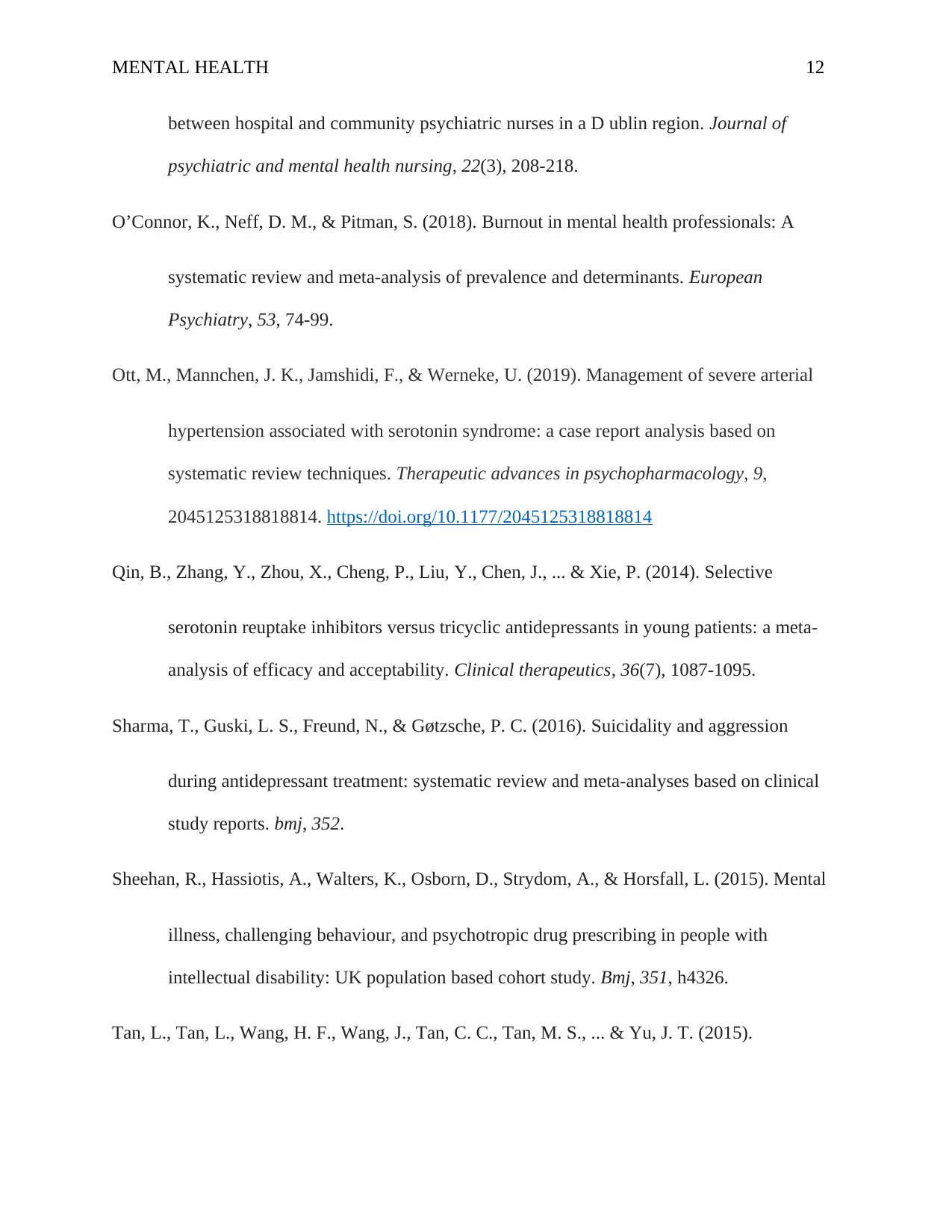
MENTAL HEALTH 12
between hospital and community psychiatric nurses in a D ublin region. Journal of
psychiatric and mental health nursing, 22(3), 208-218.
O’Connor, K., Neff, D. M., & Pitman, S. (2018). Burnout in mental health professionals: A
systematic review and meta-analysis of prevalence and determinants. European
Psychiatry, 53, 74-99.
Ott, M., Mannchen, J. K., Jamshidi, F., & Werneke, U. (2019). Management of severe arterial
hypertension associated with serotonin syndrome: a case report analysis based on
systematic review techniques. Therapeutic advances in psychopharmacology, 9,
2045125318818814. https://doi.org/10.1177/2045125318818814
Qin, B., Zhang, Y., Zhou, X., Cheng, P., Liu, Y., Chen, J., ... & Xie, P. (2014). Selective
serotonin reuptake inhibitors versus tricyclic antidepressants in young patients: a meta-
analysis of efficacy and acceptability. Clinical therapeutics, 36(7), 1087-1095.
Sharma, T., Guski, L. S., Freund, N., & Gøtzsche, P. C. (2016). Suicidality and aggression
during antidepressant treatment: systematic review and meta-analyses based on clinical
study reports. bmj, 352.
Sheehan, R., Hassiotis, A., Walters, K., Osborn, D., Strydom, A., & Horsfall, L. (2015). Mental
illness, challenging behaviour, and psychotropic drug prescribing in people with
intellectual disability: UK population based cohort study. Bmj, 351, h4326.
Tan, L., Tan, L., Wang, H. F., Wang, J., Tan, C. C., Tan, M. S., ... & Yu, J. T. (2015).
between hospital and community psychiatric nurses in a D ublin region. Journal of
psychiatric and mental health nursing, 22(3), 208-218.
O’Connor, K., Neff, D. M., & Pitman, S. (2018). Burnout in mental health professionals: A
systematic review and meta-analysis of prevalence and determinants. European
Psychiatry, 53, 74-99.
Ott, M., Mannchen, J. K., Jamshidi, F., & Werneke, U. (2019). Management of severe arterial
hypertension associated with serotonin syndrome: a case report analysis based on
systematic review techniques. Therapeutic advances in psychopharmacology, 9,
2045125318818814. https://doi.org/10.1177/2045125318818814
Qin, B., Zhang, Y., Zhou, X., Cheng, P., Liu, Y., Chen, J., ... & Xie, P. (2014). Selective
serotonin reuptake inhibitors versus tricyclic antidepressants in young patients: a meta-
analysis of efficacy and acceptability. Clinical therapeutics, 36(7), 1087-1095.
Sharma, T., Guski, L. S., Freund, N., & Gøtzsche, P. C. (2016). Suicidality and aggression
during antidepressant treatment: systematic review and meta-analyses based on clinical
study reports. bmj, 352.
Sheehan, R., Hassiotis, A., Walters, K., Osborn, D., Strydom, A., & Horsfall, L. (2015). Mental
illness, challenging behaviour, and psychotropic drug prescribing in people with
intellectual disability: UK population based cohort study. Bmj, 351, h4326.
Tan, L., Tan, L., Wang, H. F., Wang, J., Tan, C. C., Tan, M. S., ... & Yu, J. T. (2015).
⊘ This is a preview!⊘
Do you want full access?
Subscribe today to unlock all pages.

Trusted by 1+ million students worldwide
1 out of 13
Related Documents
Your All-in-One AI-Powered Toolkit for Academic Success.
+13062052269
info@desklib.com
Available 24*7 on WhatsApp / Email
![[object Object]](/_next/static/media/star-bottom.7253800d.svg)
Unlock your academic potential
Copyright © 2020–2025 A2Z Services. All Rights Reserved. Developed and managed by ZUCOL.





